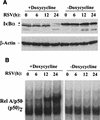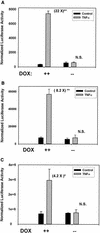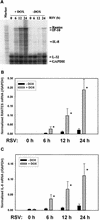Identification of NF-kappaB-dependent gene networks in respiratory syncytial virus-infected cells
- PMID: 12050393
- PMCID: PMC136270
- DOI: 10.1128/jvi.76.13.6800-6814.2002
Identification of NF-kappaB-dependent gene networks in respiratory syncytial virus-infected cells
Abstract
Respiratory syncytial virus (RSV) is a mucosa-restricted virus that is a leading cause of epidemic respiratory tract infections in children. In epithelial cells, RSV replication activates nuclear translocation of the inducible transcription factor nuclear factor kappaB (NF-kappaB) through proteolysis of its cytoplasmic inhibitor, IkappaB. In spite of a putative role in mediating virus-inducible gene expression, the spectrum of NF-kappaB-dependent genes induced by RSV infection has not yet been determined. To address this, we developed a tightly regulated cell system expressing a nondegradable, epitope-tagged IkappaBalpha isoform (Flag-IkappaBalpha Mut) whose expression could be controlled by exogenous addition of nontoxic concentrations of doxycycline. Flag-IkappaBalpha Mut expression potently inhibited IkappaBalpha proteolysis, NF-kappaB binding, and NF-kappaB-dependent gene transcription in cells stimulated with the prototypical NF-kappaB-activating cytokine tumor necrosis factor alpha (TNF-alpha) and in response to RSV infection. High-density oligonucleotide microarrays were then used to profile constitutive and RSV-induced gene expression in the absence or presence of Flag-IkappaBalpha Mut. Comparison of these profiles revealed 380 genes whose expression was significantly changed by the dominant-negative NF-kappaB. Of these, 236 genes were constitutive (not RSV regulated), and surprisingly, only 144 genes were RSV regulated, representing numerically approximately 10% of the total population of RSV-inducible genes at this time point. Hierarchical clustering of the 144 RSV- and Flag-IkappaBalpha Mut-regulated genes identified two discrete gene clusters. The first group had high constitutive expression, and its expression levels fell in response to RSV infection. In this group, constitutive mRNA expression was increased by Flag-IkappaBalpha Mut expression, and the RSV-induced decrease in expression was partly inhibited. In the second group, constitutive expression was very low (or undetectable) and, after RSV infection, expression levels strongly increased. In this group, NF-kappaB was required for RSV-inducible expression because Flag-IkappaBalpha Mut expression blocked their induction by RSV. This latter cluster includes chemokines, transcriptional regulators, intracellular proteins regulating translation and proteolysis, and secreted proteins (complement components and growth factor regulators). These data suggest that NF-kappaB action induces global cellular responses after viral infection.
Figures










Similar articles
-
Identification of a nuclear factor kappa B-dependent gene network.Recent Prog Horm Res. 2003;58:95-130. doi: 10.1210/rp.58.1.95. Recent Prog Horm Res. 2003. PMID: 12795416 Review.
-
Respiratory syncytial virus-induced RANTES production from human bronchial epithelial cells is dependent on nuclear factor-kappa B nuclear binding and is inhibited by adenovirus-mediated expression of inhibitor of kappa B alpha.J Immunol. 1998 Jul 15;161(2):1007-16. J Immunol. 1998. PMID: 9670982
-
Ribavirin treatment up-regulates antiviral gene expression via the interferon-stimulated response element in respiratory syncytial virus-infected epithelial cells.J Virol. 2003 May;77(10):5933-47. doi: 10.1128/jvi.77.10.5933-5947.2003. J Virol. 2003. PMID: 12719586 Free PMC article.
-
The major component of IkappaBalpha proteolysis occurs independently of the proteasome pathway in respiratory syncytial virus-infected pulmonary epithelial cells.J Virol. 1998 Jun;72(6):4849-57. doi: 10.1128/JVI.72.6.4849-4857.1998. J Virol. 1998. PMID: 9573251 Free PMC article.
-
Interactions of NF-kappaB with chromatin: the art of being at the right place at the right time.Nat Immunol. 2005 May;6(5):439-45. doi: 10.1038/ni1196. Nat Immunol. 2005. PMID: 15843800 Review.
Cited by
-
Nasopharyngeal and Peripheral Blood Type II Interferon Signature Evaluation in Infants during Respiratory Syncytial Virus Infection.Medicina (Kaunas). 2024 Feb 2;60(2):259. doi: 10.3390/medicina60020259. Medicina (Kaunas). 2024. PMID: 38399546 Free PMC article.
-
Expression of an IKKgamma splice variant determines IRF3 and canonical NF-kappaB pathway utilization in ssRNA virus infection.PLoS One. 2009 Nov 26;4(11):e8079. doi: 10.1371/journal.pone.0008079. PLoS One. 2009. PMID: 19956647 Free PMC article.
-
Epidemiologic, experimental, and clinical links between respiratory syncytial virus infection and asthma.Clin Microbiol Rev. 2008 Jul;21(3):495-504. doi: 10.1128/CMR.00054-07. Clin Microbiol Rev. 2008. PMID: 18625684 Free PMC article. Review.
-
RSV Reprograms the CDK9•BRD4 Chromatin Remodeling Complex to Couple Innate Inflammation to Airway Remodeling.Viruses. 2020 Apr 22;12(4):472. doi: 10.3390/v12040472. Viruses. 2020. PMID: 32331282 Free PMC article. Review.
-
Regulatory role of microRNAs in virus-mediated inflammation.J Inflamm (Lond). 2024 Nov 4;21(1):43. doi: 10.1186/s12950-024-00417-7. J Inflamm (Lond). 2024. PMID: 39497125 Free PMC article. Review.
References
Publication types
MeSH terms
Substances
Grants and funding
LinkOut - more resources
Full Text Sources
Other Literature Sources

